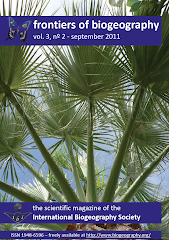PhD position in the project “Macroecology and diversity of species interactions” at the University of Oulu, Finland.
Coevolution among species via species interactions is the major driving
force of biodiversity. Yet, the concept of and metrics to estimate
species interactions is largely missing from biodiversity studies. The
project has two major aims. First, our goal is
to create a novel community diversity index, which quantitatively grade
communities in terms of the sign, strength and variation of
interactions. We will then examine how interaction index varies relative
to taxonomic, phylogenetic and functional diversity,
stability of the communities and the level of disturbance. Second, we
aim to estimate a novel species-specific characteristic, which describes
species competitive – facilitative interaction abilities. The
association of this new metric with species capability
to adapt to global changes is then examined. The data to be used in the
project is negotiable; comprehensive and long-term bird survey data
from Europe and moth data from Finland are available. We will use a
state-of-the-art statistical modelling technique,
Joint Dynamic Species Distribution Modelling, developed by one of the
PIs of the project, Dr. James Thorson, in extracting species
associations from the survey data.
The position is for 4 years. The start date of the position is January
2018, with some flexibility. We aim that the chosen candidate will spend
6-12 months at the University of Washington (Seattle, USA) and learn
modeling techniques with Dr. Thorson. Funding
for the visit will be applied from various sources, such as Fulbright
Center. Position involves occasional teaching. The location of the
position is at the Research Unit of Ecology and Evolution, University of
Oulu, Finland. Salary is based on the University
salary system. Starting salary is about 2100-2300€ and increases with
experience. Health care is provided by the employer.
Research Group. Principal Investigators of the
project are Dr. Jukka Forsman (University of Oulu, Finland) and Dr.
James Thorson (National Marine Fisheries Service, NOAA, Seattle, USA).
Other collaborators of the project are Vincent
Devictor (University of Montpellier, France), Mikko Mönkkönen
(University of Jyväskylä) and Panu Välimäki (University of Oulu,
Finland).
Qualification requirements. Applicants must
have a Master of Science degree in ecology, evolutionary biology,
statistical modeling or related areas. The recruited person is expected
to be enterprising and have excellent English communication
skills, as well as experience programming in the R statistical
environment. Following qualifications and experience is considered as an
advantage: managing and analyzing large data sets, species distribution
modeling, experience in estimating diversity indexes
(taxonomic, functional and phylogenetic), statistical modelling,
experience in applying GIS-data on biological systems, and global change
studies.
Contact persons for further information. Project leaders Jukka Forsman, email: jukka.forsman (at)oulu.fi, tel.: +358 2494 481951 and Dr. James Thorson, email: James.T.Thorson(at)gmail.com
Please send applications through university recruitment system:




